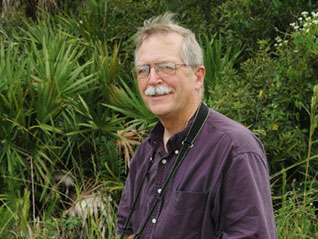
Photographed by Bette Jackson
If you are have difficulty playing the audio click here
Length of Segment: 00:01:16
Hi, I'm Dr. Jerry Jackson, out with the wild things. When is the last time you changed the filters on your car or on your home air-conditioner? A dirty filter can be expensive in terms of energy efficiency and stress on the system. A wetland is a kind of filter. Keeping it in place, clean and functioning properly, is also critical to the efficiency and proper functioning of an ecosystem and to our well-being. The source of water is often an underground aquifer, the source of clean cool well-water. A selfish but important reason for us to protect wetlands is that they serve as catch basins and filters that cleanse water flowing into underground aquifers. As water percolates through soil, pollutants are filtered out. To destroy a wetland is to reduce the size of the filter. Reducing the size of the filter means that what's left of the filter gets clogged and dirty quicker and is less efficient. With loss of wetlands, more rain water flows off the land instead of into aquifers, and water entering our aquifers may not be as pure as we would like it. Reduced aquifer levels result in lowered levels of lakes and streams, less water is available for plants and animals, and the impacts can be far-reaching.
'With the Wild Things' is produced at the Whitaker Center in the College of Arts and Sciences at Florida Gulf Coast University. For 'The Wild Things', I'm Dr. Jerry Jackson.
< Back to Wetlands
For permissions please contact the owning institution. WGCU Public Media, 10501 FGCU Blvd. S., Fort Myers, FL 33965




